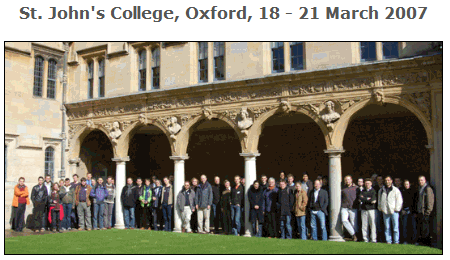|
|
|
|
|
|
|
News & Views item - August 2008 |
![]() Oxford and Elitism. (August 12, 2008)
Oxford and Elitism. (August 12, 2008)
On August 5 The Guardian published an article by Polly Toynbee and David Walker with the header "'Here on display was the great fissure in class, race, style, attitude, background, life-experience and confidence.' Polly Toynbee and David Walker accompany Brent school students on a visit to Oxford".
The pupils of [Brent's] Capital City academy have been sent to Oxford to urge them to aspire, and over one weekend are given a tantalizing taste of life behind the college gates among those manicured lawns. The Aimhigher programme had chosen the likeliest 16-year-olds in their GCSE [General Certificate of Secondary Education] year from this school to spend two days in Oxford. They were staying in rooms in St John's of such comfort and spaciousness they found it hard to believe they could be for their use. They were briefly sampling a world of privilege most of them barely knew existed.
Some 72% of Brent school students are from ethnic minorities - and virtually all these 16-year-olds were black or brown... Unlike the children of graduates, the Brent students had no one to tell them tales of student life, no sister or cousin to whisper to them that university for most young people is a time of lounging around and enjoyment, interspersed with panicky bursts of academic work; no one to share the anxieties of upward social mobility and sometimes the deep sense of loss.
The Brent students will likely find themselves in a rust-stained concrete former polytechnic not far from home in London, to save money. A seductive glimpse of Oxford might leave them feeling they failed, when to make it to university at all would be success against extreme odds... they could see that gaining a place at Oxford would be like climbing Everest without oxygen or crampons. But they came away exhilarated, all of them vowing to try harder, to work hard, to get the best possible marks at GCSE and then at A-level.

Today The Guardian gave Tom Kemp, admissions tutor at St John's College, Oxford, the right to reply. Some excerpts.
I am... sorry for the lack of discussion about what the authors think Oxford University should be doing to level the playing field for applicants from such disadvantaged backgrounds.
I think we [at Oxford] are right to insist that our primary role in society is to maintain the teaching and research excellence that places us in the forefront of universities worldwide.
Nevertheless, as an admissions tutor I am perfectly aware that something is amiss... between the proportion of students admitted to Oxford from the private schools and the proportion of the school population.
The simple starting fact is... It is completely immaterial to us what gender, colour or nationality they are, or what their family background, sexual orientation or anything else is. But how are we to find those with the highest academic potential?
Dr Kemp then lists the various exam data and type of subjects taken in secondary school that are evaluated, adding: "given the huge effort put into admissions (up to four interviews to about four times the number of candidates than places available), no one can reasonably accuse us of not working towards being fair to all, even if we have a good way to go."
Oxford is trying to overcome the greatest barrier: persuading students from underprivileged backgrounds that getting into Oxford needn't "be like climbing Everest without oxygen or crampons". Participation in AimHigher and other such schemes, open days, and the visits to schools by admissions staff are serious attempts to reach out to those who do not think that Oxford could ever be for the likes of them.
He concludes: "Studying at Oxford actually need cost no more than at a London 'rust-stained, concrete former polytechnic'".